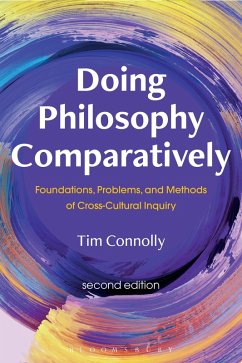What standards should we use to evaluate culturally distinct philosophies? What kind of barrier does language or cultural difference pose in our attempts to understand other traditions? How do we avoid our comparisons being biased?
Doing Philosophy Comparatively answers these questions by providing a thorough overview of the methodology involved in extending philosophy across linguistic and cultural boundaries.
Now revised and updated to showcase the most recent developments in the field, this second edition engages with philosophies beyond the Anglo-European tradition and features:
· Examples of cross-cultural philosophy from a wider range of non-Western traditions
· Methodological innovations from works of comparative philosophy published in the last decade
· Focused exercises for each chapter demonstrating how to interact meaningfully with primary texts and engage with recent debates in comparative philosophy
· Updated discussion questions and readings
Introducing the main problems, methods, and approaches of comparative philosophy, this new edition shows you how to make informed cross-cultural judgments through reflection and practice. It remains an essential toolkit for the practice of doing comparative philosophy.
Doing Philosophy Comparatively answers these questions by providing a thorough overview of the methodology involved in extending philosophy across linguistic and cultural boundaries.
Now revised and updated to showcase the most recent developments in the field, this second edition engages with philosophies beyond the Anglo-European tradition and features:
· Examples of cross-cultural philosophy from a wider range of non-Western traditions
· Methodological innovations from works of comparative philosophy published in the last decade
· Focused exercises for each chapter demonstrating how to interact meaningfully with primary texts and engage with recent debates in comparative philosophy
· Updated discussion questions and readings
Introducing the main problems, methods, and approaches of comparative philosophy, this new edition shows you how to make informed cross-cultural judgments through reflection and practice. It remains an essential toolkit for the practice of doing comparative philosophy.









